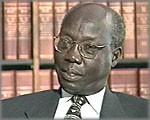UN Envoy Urges Support For Peacekeeping Mission In Sudan
UNITED NATIONS, Aug 5, 2004 (AP) — A former Sudanese foreign minister who is now a U.N. envoy urged the United States and other countries to support the African Union’s beefed-up peacekeeping mission in western Darfur without intervening directly.
 Francis Deng, who just returned from Sudan, said he believes the government will be receptive to the African group’s plan announced Wednesday to deploy 1,800 peacekeeping troops instead of sending a 300-member protection force.
Francis Deng, who just returned from Sudan, said he believes the government will be receptive to the African group’s plan announced Wednesday to deploy 1,800 peacekeeping troops instead of sending a 300-member protection force.
A senior member of Sudan ‘s ruling party, Mohammed Ali Abdullah, warned Wednesday that the African nation could become a battlefield like Afghanistan or Iraq if foreign military forces try to enter the country to end the 17-month Darfur conflict.
But Deng told a news conference he believes the Sudanese distinguish between forces from the African Union and international military forces that would possible intervene as a result of Security Council action under the U.N. Charter.
The Sudanese government was “quite happy” to have AU monitors and an AU force in Darfur to protect humanitarian aid workers, he said. “I believe they would also be receptive to increasing the presence and the mandate to include protecting the civilian population.”
Deng, who is Secretary-General Kofi Annan’s special representative on the “internally displaced” -people who have fled their homes but remain within their country -said “the fact that the AU said it’s an African problem that Africans should solve has given the Sudanese a sort of umbrella, or a cover.”
The AU is now “more appealing to them, compared to what else could happen, and as a result we have a good prosect of getting close cooperation with the government working within the framework of the AU,” he said.
Deng said the crisis in Darfur must be seen as the latest tragedy in a half-century of conflict spawned primarily by discrimination. He cited the rebellion in southern Sudan and conflicts in the Nuba mountains and the southern Blue Nile region.
“If you became a Muslim and you were Arabic speaking … and imagined that you had Arab blood, you were superior compared to blacks and heathens who were legitimate targets for slavery -downtrodden,” Deng said.
But he said it was too simplistic to talk about a north-south split, a struggle between Sudan ‘s Arab Muslim north and its Christian and animist-dominated south.
As a result of the long struggle by the people in the south, Deng said, Muslims from the north who are not Arabs “are beginning to be aware of the racial discrimination against them in the north. And taking the example of the south, they are rising against what they see as marginalization and discrimination.”
This “painful” situation also provides an opportunity for Sudan ‘s leaders to recognize “that there is a quest for equality throughout the country” and that there is a possibility of building a united nation, he said.
An agreement ending the 21-year civil war between government forces and rebels in southern Sudan is expected to be finalized shortly, but Deng warned that it could be jeopardized by the international approach to Darfur.
“The United States has played a leading role in fostering peace in the south,” Deng said. “It would be difficult to see how countries that are working for peace in one part of the country can be confrontational in another part and expect to continue their constructive role in the peace process.”
He called for a substantial international presence in Sudan -not just AU troops but humanitarian workers and possibly an international police force -to serve as protection for the civilians in Darfur and to report on efforts to end the conflict.
“A lot can be done by the international community to strengthen the AU mandate without the international community being seen directly to intervene in a military sense,” Deng said.
Annan urged Sudan ‘s leaders on Wednesday to honor their July 3 commitments to the United Nations to protect civilians and immediately start disarming the pro-government Arab militia, known as Janjaweed, and other outlawed forces.
The United States and humanitarian groups accuse the government of backing the Janjaweed during the conflict that has killed up to 30,000 people, forced over 1 million to flee their homes, and left 2.2 million in desperate need of food and medicine.
The Sudanese government denies supporting the Arab militias, but Deng said “reliable evidence” suggests otherwise.
This relationship makes it “quite difficult” for the government to disarm and punish the Janwaweed, he said.
The government also fears that disarming the Arab militias could shift power to rebels from Darfur’s African tribes, so there must also be a cease-fire and negotiations with the rebels, Deng said.
